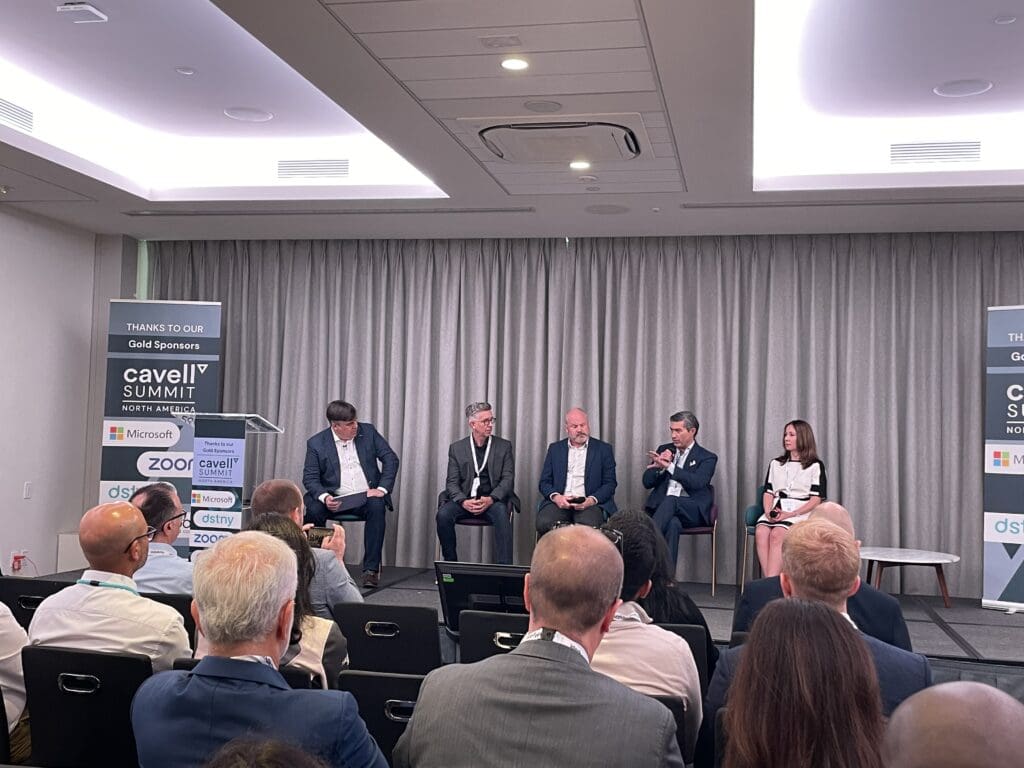AI, Voice, and the Future of Communication: Insights from Cavell Summit North America 2024
On October 1st, Cavell hosted its annual North America Summit which brought together telcos, service providers, and vendors to discuss the challenges, trends and opportunities within the UCaaS and CCaaS markets in 2024. It was attended by over 220 guests, 40% of which were C-suite, and included speakers from industry-leaders like Microsoft, Cisco, Zoom, Comcast and Verizon.
From the rise of AI-driven systems to the future of mobility, Cavell Summit North America delivered insights into how businesses are adapting to and harnessing new technologies. Here’s a roundup of some of the most impactful sessions and insight from thought leaders from the event.
Bridging Traditional and AI-Driven Communications by Jamie Hill – Head of Global UCaaS, Zoom
In his keynote address, Jamie Hill posed a thought-provoking question: “How many of you think voice is becoming obsolete?” He argued that rather than fading away, voice communication is undergoing a transformation thanks to AI. Hill emphasised that AI has revolutionised voice interactions, enabling individuals and organisations to recover “the 90% of missed conversations.” With the ability to merge interactions across channels—voice, messaging, video—AI is enhancing productivity and driving growth.
Key takeaways from Hill’s session included how AI can:
- Boost individual productivity by automating tasks and providing seamless communication across platforms.
- Facilitate team collaboration, offering insights from external sources and improving employee engagement.
- Transform business operations, from IT and HR to customer service, with a focus on driving better outcomes.
Telco to Techco with Verizon, Comcast, Momentum and TELUS
This panel focused on how traditional telecom providers are evolving into tech companies (“techcos”). This change is needed as integration and data requirements, coupled with more complex solutions are creating additional pressures on telecoms companies to provide a broader portfolio of services.

Some of the ways panellists are tackling this issue are:
- Verizon’s approach: Finding ways to scale and manage more digital solutions efficiently.
- Comcast’s focus on customer experience (CX): Delivering solutions across both small businesses and enterprise clients.
- TELUS’s challenge: Ensuring that value is created for their partners and customers through better tools and sales support.
- Momentum’s strategy: Leveraging expertise and upskilling to close service gaps.
The panel also explored the role of platforms and the importance of integration, as well as the shifting skillsets required in a rapidly evolving market, with both companies and employees having to embrace new approaches to find success.
The Vision of Communications, Collaboration, and AI with Microsoft by Taimoor Husain – Global Telco Strategy Lead, Microsoft
Taimoor Husain’s keynote highlighted Microsoft’s vision for integrating AI into everyday workflows, focusing on tools like CoPilot Agents and Microsoft Teams Copilot. These innovations are designed to act as proactive collaborators, improving team communication and hybrid work efficiency. Husain also discussed how AI can personalise work experiences, such as suggesting the optimal time to visit the office based on colleagues’ schedules.
This keynote was well-timed as Cavell’s latest research on AI, efficiency and productivity gains are seen as the main benefit companies are looking to achieve across all company sizes and markets.
The Future of Voice: Integrating AI and FMC in Modern Business Communications by Mark Herbert – Chief Partner Evangelist, Dstny
Mark Herbert’s keynote tackled the evolving role of voice communication in business, highlighting the importance of Fixed Mobile Convergence (FMC) in future communications. Herbert emphasised that while voice remains one of the most natural forms of communication, the integration of FMC technology will enhance both customer and employee experiences. His discussion of FMC 3.0 pointed to the next generation of mobile-driven business communications, aiming to make mobile the centrepiece of global communication systems.
AI in Action by Matt Bryars – AI Strategist & Co-Founder, AIphoria
Matt Bryars showcased how AI can be simplified and made more accessible for businesses of all sizes. His presentation focused on delivering affordable AI solutions for transcription and data analysis, emphasizing ease of use and personalization. A key highlight was the demonstration of AI’s ability to transcribe, structure, and analyse communications data, presenting an actionable framework for businesses to optimize their processes. .
AI and the Evolution of Modern Communications with Microsoft, Zoom, Cisco and BluIP
This session featured discussions on how each company is using AI to enhance communications:
- Microsoft: Infusing AI across workflows, making it second nature for customers.
- Zoom: Simplifying the user experience while boosting productivity.
- Cisco: Acting as a technology partner to improve customer service.
- BluIP: Offloading customer calls to AI-driven reservation systems.
This panel was specifically interesting, as AI is one of the future differentiators for communications. According to Cavell’s latest research on AI, 39% of companies with more than 1000 employees are already using AI for their communications, but only 28% of companies with 50-249 employees say the same.
The Changing Requirements of SMBs with Crexendo, Intermedia, Phone.com and 2600Hz
SMBs are under pressure to compete with larger enterprises, and this panel explored how they can leverage new tools to stay ahead. The speakers highlighted the importance of simplicity, cost-effectiveness, and AI, which could offer smaller companies the opportunity to scale without increasing complexity.

CX in 2030 with Mitel, C1 and 8×8
This panel took a forward-looking approach to customer experience (CX), forecasting mass personalization and the rise of AI-driven customer interactions by 2030. While AI and automation are expected to reduce human intervention in customer service, the panellists agreed that human agents would still play a vital role, particularly in delivering personalised and complex support.
The Road Ahead for Communications
Cavell Summit North America 2024 highlighted how AI, voice technology, and mobility are reshaping the communications landscape. Businesses must embrace these changes to remain competitive, with AI being central to improving productivity, enhancing CX, and enabling seamless hybrid work environments. From AI-powered workflows to the resurgence of voice and FMC, the future of communications looks more integrated, efficient, and intelligent than ever before.
This summit clearly indicated that as telcos evolve into techcos, the focus will increasingly shift towards providing scalable, secure, and customer-centric solutions in an AI-driven world.
